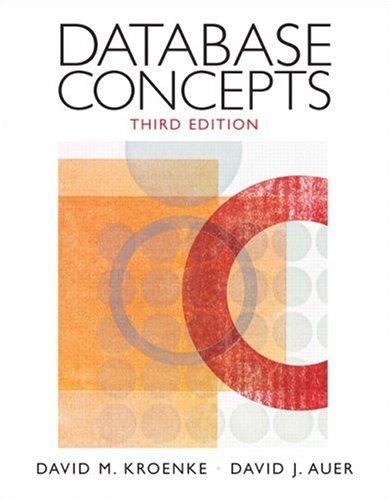Question
C++. Gradebook, For your test you should test more than one class gradebook. For example make gradebook for all your courses you currently have. CPP
C++. Gradebook, For your test you should test more than one class gradebook. For example make gradebook for all your courses you currently have.
CPP file:
#include
#include "Gradebook.h"
using namespace std;
using GradeBook10_3 = Gradebook<10, 3>;
int GradeBook10_3::TotalNumGradebooks{ 0 };
int main()
{
array< array
{
{{88, 90, 92},
{39, 55, 67},
{69, 49, 85},
{70, 72, 77},
{80, 81, 88},
{91, 93, 90},
{83, 89, 79},
{90, 74, 77},
{85, 67, 70},
{55, 45, 35}}
};
GradeBook10_3 myGradebook("VGP102 C++ Programming I", grades);
myGradebook.displayMessage();
myGradebook.processGrades();
Gradebook<10, 3> copyGradebook(myGradebook);
copyGradebook.processGrades();
std::cout << "TotalNumGradebooks=" <<
GradeBook10_3::TotalNumGradebooks << std::endl;
return 0;
}
header file:
#pragma once
// using 2 dimensional array to store student test grades.
#include
#include
#include
#include
// Gradebook class definition
template
class Gradebook
{
public:
static int TotalNumGradebooks;
using StudentGrades = std::array
using CourseGrades = std::array
// constructors
Gradebook(std::string const& name,
CourseGrades const& gradeArray)
: courseName(name), grades(gradeArray)
{
++TotalNumGradebooks;
}
Gradebook() = delete; // default constructor is not available
Gradebook(Gradebook const& book): // copy constructor
courseName(book.getCourseName()),
grades(book.getGrades())
{
++TotalNumGradebooks;
}
~Gradebook()
{
--TotalNumGradebooks;
std::cout << "A gradebook destroyed. TotalNumGradebooks="
<< TotalNumGradebooks << std::endl;
}
void setCourseName(std::string const& name)
{
courseName = name;
}
std::string const& getCourseName() const
{
return courseName;
}
CourseGrades const& getGrades() const
{
return grades;
}
void displayMessage() const
{
std::cout << "Welcome to theg rad book for " << getCourseName() << "! ";
}
void processGrades() const
{
outputGrades(); // output grades array
std::cout << " Lowest grade in th gradebook is " << getMinimum()
<< " Highetst grade in the gradebook is " << getMaximum() << std::endl;
outputBarChart();
}
int getMinimum() const
{
int lowGrade{ 100 };
for (auto const& studentgrades : grades)
{
for (auto const& grade : studentgrades)
{
if (grade < lowGrade)
lowGrade = grade;
}
}
return lowGrade;
}
int getMaximum() const
{
int highGrade{ 0 };
for (auto const& studentgrades : grades)
{
for (auto const& grade : studentgrades)
{
if (grade > highGrade)
highGrade = grade;
}
}
return highGrade;
}
void outputBarChart() const
{
std::cout << " Overall grade distribution: ";
const size_t frequencySize{ 11 };
std::array
for (auto const& student : grades)
{
for (auto const& test : student)
++frequency[test / 10];
}
// print the bar chart:
for (size_t count{ 0 }; count < frequencySize; ++count)
{
// first output label for each bar
if (0 == count)
std::cout << " 0-9: ";
else if (10 == count)
std::cout << " 100: ";
else
std::cout << count * 10 << "-" << (count * 10) + 9 << ": ";
//print bar of astrisks
for (unsigned int stars{ 0 }; stars < frequency[count]; ++stars)
std::cout << "*";
std::cout << std::endl;
}
}
// output the content of the grade array
void outputGrades() const
{
}
// determine average grade for a particular student
double getAverageGradePerStudent(int studentIndex) const
{
return 0.;
}
// determine average grade for a particular test
double getAverageGradePerTest(int testIndex) const
{
return 0.;
}
// sorts each student tests in the increasing order
void sortStudentTests()
{
}
// sorts the outer array based on student's average. This means the first student array
// should correspond to student with highest average on his/her tests.
void sortGradeBook()
{
}
private:
std::string courseName;
CourseGrades grades; // 2D array
};
Step by Step Solution
There are 3 Steps involved in it
Step: 1

Get Instant Access to Expert-Tailored Solutions
See step-by-step solutions with expert insights and AI powered tools for academic success
Step: 2

Step: 3

Ace Your Homework with AI
Get the answers you need in no time with our AI-driven, step-by-step assistance
Get Started


